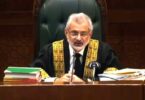ISLAMABAD (Agencies): A petition was filed in the Supreme Court on Tuesday against military trials, convictions and sentences of 29 civilians during the tenure of former prime minister and PTI Chairman Imran Khan.
The petition, sought to declare “investigations and trials of civilian accused persons under the Pakistan Army Act, 1952, read with, the Official Secrets Act, 1923, and all actions taken subsequently in pursuant to it” as void from the beginning and of “no legal effect”.
The plea — which has not been fixed for hearing yet — was filed by Inamur Rahim, a lawyer and retired colonel, and named the Federation of Pakistan through the defence secretary, Imran, former army chief General Qamar Javed Bajwa, former director general of the Inter-Services Intelligence (ISI) Lieutenant General Faiz Hameed, Judge Advocate General at the General Headquarters, and registrars of all the Lahore (Pindi bench), Islamabad, Karachi, Peshawar and Balochistan high courts.
It stated that the trials of civilians under army laws were a result of the “unconstitutional decision of the federal government then headed by” Imran, who the petition said was “abetted” by then-army chief Gen (retd) Bajwa and Lt Gen Hameed. The plea termed the trial of 29 civilians under the Army Act “in an unprecedented manner” a matter of grave public importance“ and a violation of fundamental rights guaranteed under Articles 10-A, 14, and 25 of the Constitution.
“The said trials were in violation of the fundamental rights as embodied in Chapter I of Part II of the Constitution of Islamic Republic of Pakistan, 1973, and thus, are a matter of public importance,” the plea said. It maintained that Imran had himself filed a petition in the apex court seeking to declare military trials of civilians unlawful “whereas, the trials of these [29] civilians under the Pakistan Army Act, 1952, read with, the Official Secrets Act, 1923 were conducted on his orders being the chief executive of the country”.
Therefore, the plea continued, Imran’s conduct “is an admission of the illegal acts and offences committed by him, for which he must be held responsible”. The petition listed the civilians who were tried in military courts during the PTI’s tenure, adding that the families of these persons were not even informed about their arrests or whereabouts.
The 29 civilians named in the petition include Syed Adil Hussain Shah, Idrees Khattak, Muhammad Hussain, Ahmed Nawaz, Muhammad Imtiaz Khan, Habib Qadir, Ajmal Khan, Mohammad Saddique, Raja Mushtaq Ahmed, Syed Imtiaz Shah, Abid Zaheer, Muhammad Usman Akram Kiyani, Muhammad Haider, Ashfaq Masih, Asif Mehmood Shahid, Muhammad Amir Khan, Imtiaz Ahmed, Mushtaq Ahmed, Muhammad Akbar, Khizer Ahmed, Shahzad Asghar, Muhammad Asif Khan, Muhammad Irshad, Syed Irfan Hussain, Lt Col (retd) Akmal Ashraf, Lt Col (retd) Faiz Rasool, Maj (retd) Saifullah Babar, and Hassan Askari. Of these civilians, the petition added, only five were allowed to have counsels of their choice engaged by their families.
“The reasons were very simple as Idrees Khattak was working for Amnesty International, therefore, due to international pressure, his family members were allowed to meet him during the trial and accordingly they engaged the counsel of his choice for him. “The same was the case of three retired officers who were also civilians within the purview of section 92 of the PAA 1952,” the plea highlighted.
Referring to the trial of Hassan Askari — who had criticised Imran’s decision of giving Gen (retd) Bajwa an extension — it said, “Military court on August 20, 2021, awarded him five years of rigorous imprisonment during Imran Khan’s era.” The petition recalled that Askari was later moved to a high-security cell in Sahiwal and not moved to the Adiala Jail despite court directions. “It is learnt that recently the present government released the convicted engineer by granting him remission.”
However, the plea added, details of the whereabouts of the remaining civilians were not provided to their families until they were convicted and transferred to jail. “They were not allowed to engage a counsel of their own choice during their trials. They were not allowed to produce any witnesses in their defence. In the end, they were also denied a copy of their trial proceedings,” it said. “During their trials, Articles, 4, 9, 10 and 10A of the Constitution of the Islamic Republic of Pakistan were completely disregarded. The same treatment was meted out to them before the Army Court of Appeals, where appeals of most of them were rejected without assigning any reason or judgement,” the petition added.
It further recalled that during his tenure, Imran had failed to comply with orders pertaining to the execution of production orders for missing persons. “Respondent 2 [Imran] in connivance with respondents 3 (Gen Bajwa) and 4 (Gen Faiz) and in blatant violation of the fundamental rights of the citizens, authorised the trials of 29 civilians by the military courts”. “Now respondent 2 [Imran] is befooling the public that he is a champion of the rule of law and Haqeeqi Tabdeeli (real change), whereas, after ex-general Pervez Musharraf’s era, his tenure as chief executive was the darkest era so far as blatant violations of human rights are concerned.”
The petition also detailed the current military structure in Pakistan which entails arrest and investigation, the convening of the court-martial, confirmation by the commander, revision order detailing instructions (including analysing evidence), confirmation by convening authority, confirmation of chief of army staff, trial proceedings, and appeal after confirmation of army chief. It stated that the trials of 29 civilians under the Pakistan Army Act, 1952 and the Official Secrets Act, 1923 without the registration of a first information report against them and without producing them before the magistrate was “void ab initio (void from the beginning) and of no legal effect”.
“These civilians were kept in illegal custody for years and months before their trials were commenced. A person made subject to Pakistan Army Act 1952 cannot be held in detention beyond the period of 48 hours without trial in the light of sections 74 and 75 of the Pakistan Army Act 1952,” the plea added. It subsequently prayed to declare that Imran, Gen (retd) Bajwa and Lt Gen Hameed “had exceeded their power and illegally abducted, detained and sentenced without due process of law, the civilians and in violation of their fundamental rights and constitutional guarantees given for every citizen under the constitution of the Islamic Republic of Pakistan”.
Furthermore, it requested for the initiation of criminal proceedings against Imran, Gen (retd) Bajwa and Lt Gen Hameed for “abduction, illegal detention and conviction of the 29 civilians without due process of law and in violation of the fundamental rights and constitutional guarantees for every citizen, under the constitution of the Islamic Republic of Pakistan”. It also requested the court to summon the complete record of trials of all civilians under the Pakistan Army Act, 1952, and the Official Secrets Act, 1923 for the “just and fair disposal of the petition”.







